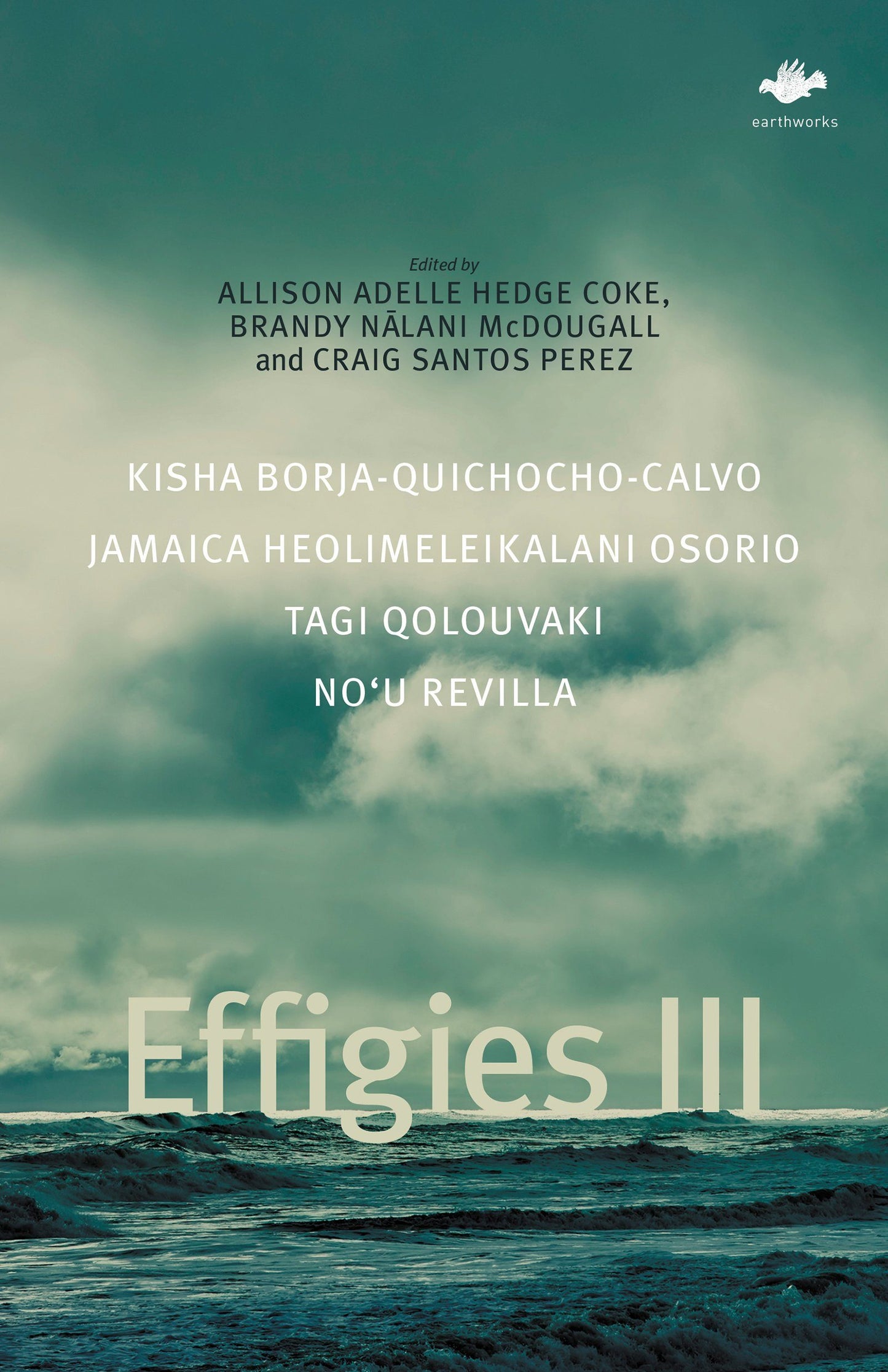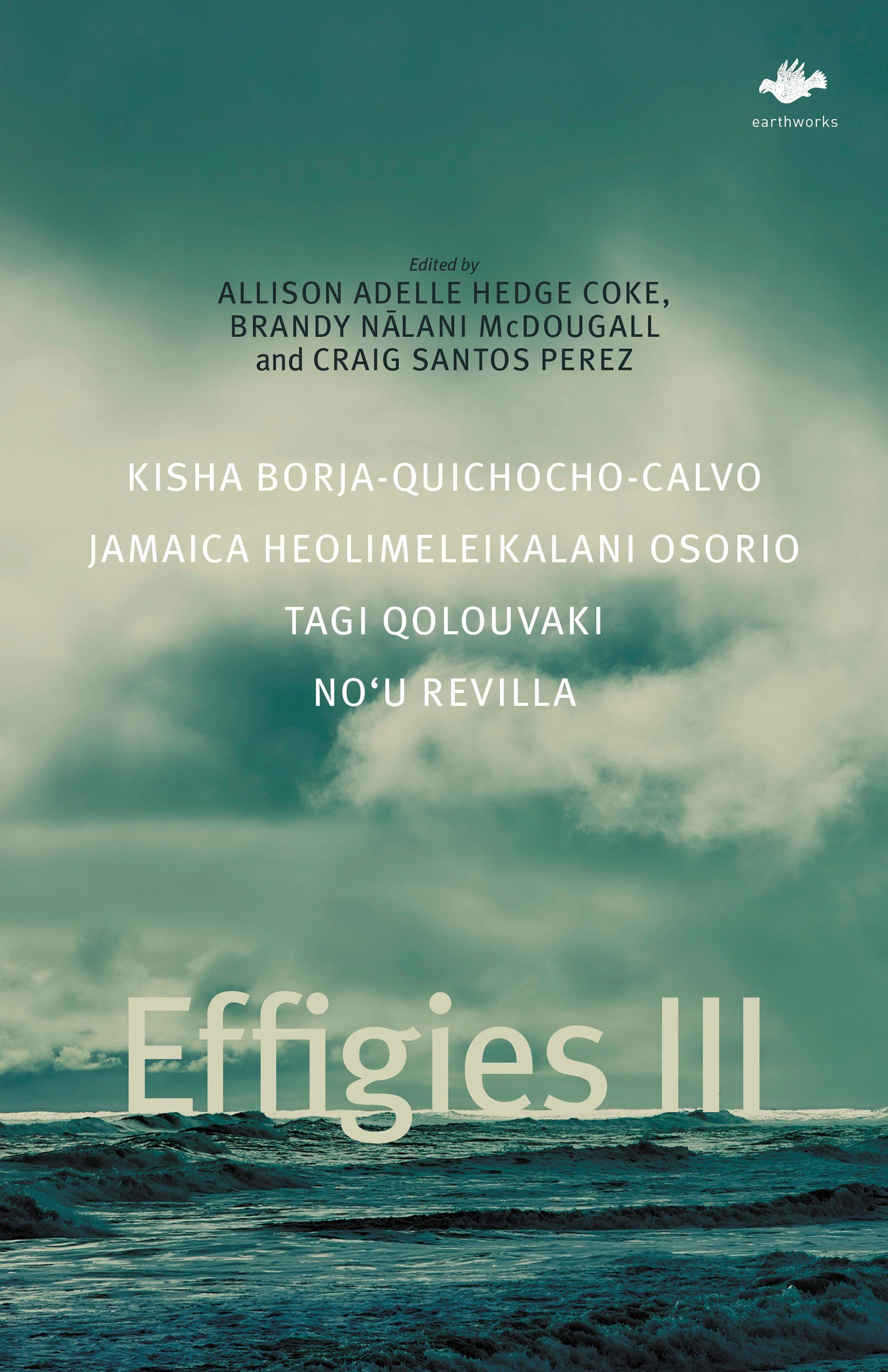Allison Adelle Hedge Coke
Effigies III
Effigies III
ISBN:9781784631833
Couldn't load pickup availability
Synopsis
Edited by Allison Adelle Hedge Coke, Brandy Nālani McDougall and Craig Santos Perez
The Effigies series has woven a vibrant tapestry of indigenous poets from Native North America and the Pacific. As the third in this series, this anthology continues this weaving with the work of four emerging Pacific islander women poets from Guam, Hawai’i, and Fiji. Despite their distant origins, all these writers explore culture, history, politics, genealogy, feminism, and the environment. They each have their own unique style, ranging from the lyric to the avant-garde. Overall, they represent the next resurgent wave of empowered and decolonial Pacific writers.
No‘u Revilla (Kanaka ‘Ōiwi), Jamaica Heolimeleikalani Osorio (Kanaka ‘Ōiwi), Kisha Borja-Quichocho-Calvo (Chamoru), and Tagi Quolouvaki (Fijian, Tongan) take readers into the vast Pacific ocean to swim beyond the reef in high tide, out to where the water meets the sky, only to circle back to the islands to taste the tears and sweat in coconut and guava, the smell of frangipani on the wind. Amidst such beauty, these poets also carry us into darkness with tremendous power and vulnerability, laying bare the ravages of colonialism—the brutal occupation of country, the violence waged against Native women and girls, the erosion of language and ancestral memory, and the forced disconnections from land, ocean, and other healing lifeways. Effigies III features four debut books that fearlessly journey through these home-islands in ways that will transform and empower.
Praise for this Book
‘To read Effigies III, a new collection of Indigenous poetry by Pacific Islander women, is to taste the sweet life giving water of a fountainhead of Oceania writing, with the bitter earth of the fight against colonialism in its many forms in the Pacific Islands. Kisha Borja-Quichocho-Calvo describes American hegemony, in island territories and Native American lands, as a He'e, an octopus, and encourages us to “sharpen our teeth, / and bite the fuck out / of the / He'e.” She writes about being Miss Guam Tourism, but her “dågan can barely fit into a bikini.” She writes about colonial perceptions, as in “We're too stupid, / too dirty, / too poor. // small, / little, / tiny. // Too / Micronesian.” Jamaica Heolimeleikalani Osorio has “forgotten my own grandparents middle names / Forgotten what color thread god used to sew me together with.” Her writings speak to the anti-colonial struggle of Native Hawaiian / Kanaka 'Oiwi for sovereignty, when “Sometimes / we are only / the song / the promise / the faint memory of a sweet melody / the mo'olelo for the next generation to carry.” The poetry of Tagi Qolouvaki sings “like the music of bone flutes.” But in her sensuous embodiments of desire is the caveat that “sugar is the blood of girmityas, itaukei and blackbirding slaves from vanuatu and the solomons to fatten the pockets of settlers and the native elite sugar is sacred dovu made toxic through refinement and poisoning the vanua”. For No'u Revilla “the pretty is in pieces all over the floor.” Beauty is inescable in her writing, “To the girl holding the / faucet in her hands // like a wand, like a good / witch: I left my dress in the // sink for you...” And then she tells us, “Sometimes I feel like 13,796 feet. / But sometimes I feel like choking.” referring to the Kanaka 'Oiwi struggle to honor the sacredness of Mauna Kea. Revilla tell us, “I am the daughter of fishermen. / Born part-bait, sent to sea. // There is no weeping in salt water.” Effigies III is a book about language, a hybrid between English and the Moana/Pacific, in the voices of women who are re-claiming the Indigenous Pacific Islands. As Qolouvaki writes “Old words will change their meanings. Perhaps, if I swallow then spit out salt water, / Sweetened by my breath / Quickened by my heartbeat / Swirled over my tongue / Just so … // aue … oiaue … // Perhaps I will recover lost words // aue … oiaue …”’ —Dan Taulapapa McMullin
‘The voices that gather here, in Effigies III, take shape and rhythm from the ocean itself. Chamoru, Kanaka ‘Ōiwi, Fijian and Tongan, these poets of Oceania speak of and for the waters and all its relatives with perceptive, critical and lyrically stunning undulations. Jamaica Heolimeleikalani Osorio’s beating of the sharkskin drum echoes a heartbeat found in Kisha Borja-Quichocho-Calvo’s letters to her young Chamoru daughter, and Tagi Qolouvaki’s stories of home and forgotten gods sing alongside No’u Revilla’s wonderfully rich exhortations, ablutions and incantations. Indigenous Oceania is gathering, and its daughters’ voices are at the forefront of positive change for the future of its islands, waters, and people.’ —Lehua M. Taitano, author of A Bell Made of Stones and Inside Me an Island
‘Effigies III gathers work “rooted 2000 generations deep” in the homelands of these Indigenous Pacific Islands’ women. A stunning collection of poetry that privileges Native knowledge, language, mapping, and gods over those imposed by colonizers, it is filled with the sacred and everyday fruits of these environments: lush images of traditional foods and medicines from fresh coconut to kava roots; home figured as mountain ranges like Ko‘olau and the treasured “latte stone huts;” and the “blue skin” of ocean ultimately indivisible from the human bodies who belong to these islands and the several Indigenous languages they speak—an ocean that “spills vowels” in these poems. But for all the poetic beauty of this collection, we should not mistake the vision or intention of these women. The work here stands as an effort to “sit in history” and to recite a “geneology of protest.” The poems unmask environmental destruction—“the god choking concrete” and islands “fracked by GMO farming / Geothermal drilling” by those who worship “dollar bill idols.” Ultimately, these words “connect us to our past” and thus “shield … our children” from the contemporary capitalistic “wildfire” that endangers us.’ —Kimberly Blaeser, author of Apprenticed to Justice, Wisconsin Poet Laureate 2015-16
Praise for Previous Work
‘Effigies II is a compilation of works from Native women poets. Editor Allison Hedge Coke says debuting these works in a collection gives these Native writers a chance to enter the literary publishing world as a community. The book is like a road trip through Indian Country through words. The poems allow the reader to experience a multi-regional view on Native life. We invite you join us live as we take in the words of Laura Da’ (Eastern Shawnee), Ungelbah Davila (Diné), Kristi Leora (Kitigan Zibi Anishinaabeg), Laura Mann, Choctaw/Cherokee/Mohawk) and Kateri Menominee (Bay Mills Tribe of Chippewa).’ —Native America Calling
‘In Effigies II we are introduced to a subtle and striking set of new indigenous voices. The five poets represented here give readers a window into the nuanced range of contemporary Native poetry and the complex polyphonic lives that work to (re)define a contemporary indigenous identity. Each of these poets establishes themselves in a defiant domain of fluidity, unwilling to settle for staid and hardened definitions of indigeneity.’ —Matthew Shenoda, author of Seasons of Lotus, Seasons of Bone
‘Allison Hedge Coke has done it again, with her keen ear and eye: brought powerful new Native women’s voices to our attention. Rigorous, powerful, brave, haunting, spirited. These collections are a refreshing antidote to any old cynical poetry tropes. Cheers all around.’ —Anne Waldman, author of The Iovis Trilogy, Manatee/Humanity, Gossamurmur
Product Details
Extent: 176pp
Format: Paperback
Publication Date: 15-Feb-19
Publication Status: Active
Series: Earthworks
Subject: Poetry anthologies (various poets)
Trim Size: 216 x 138mm


